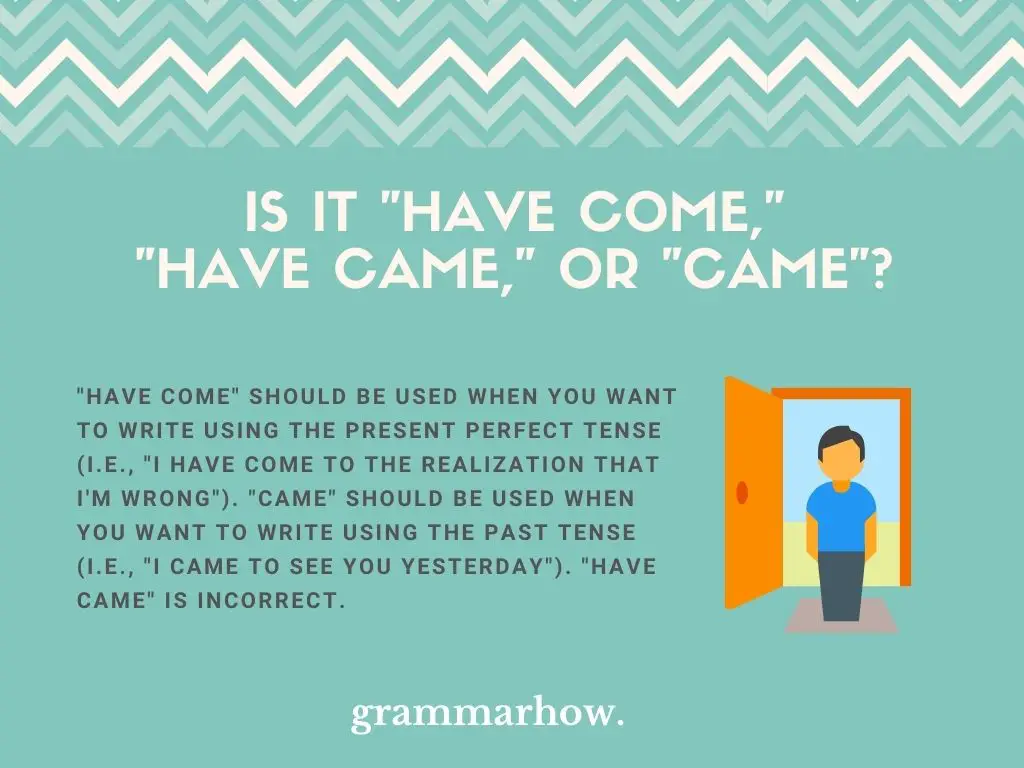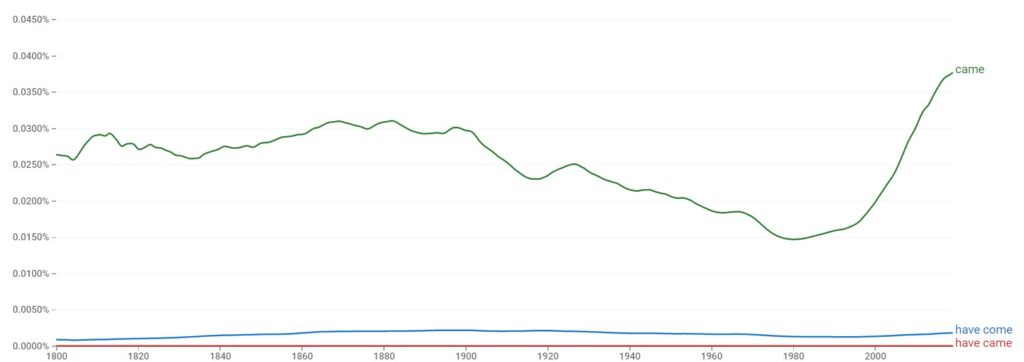Knowing the correct tense form for the verb “come” is important with the phrases “have come,” “have came,” and “came.” In this article, we’ll explore which one is the correct version and how to use it in a sentence.
Is It “Have Come,” “Have Came,” Or “Came”?
“Have come” should be used when you want to write using the present perfect tense (i.e., “I have come to the realization that I’m wrong”). “Came” should be used when you want to write using the past tense (i.e., “I came to see you yesterday”). “Have came” is incorrect.

The definition of “come,” according to The Cambridge Dictionary, is “to move or travel towards the speaker or with the speaker.”
Making sure we understand the differences with tense is important. The present perfect tense and the past tense are used differently, making it confusing to understand if you’re not brushed up on the tense rules.
To help you understand them slightly better, remember the following:
- The present perfect tense is used to say that we’ve previously moved towards something and we’re still doing so in the present.
- The past tense simply means we move towards something in the past, and it’s not happening presently.
Is “Have Come,” “Have Came,” Or “Came” Used The Most?
To elaborate on our explanation so far, we thought it would help to have a visual example of the popularity of each of the phrases. That way, you’ll be able to see which one is the most common to come across with native speakers.
According to this graph, “came” is by far the most popular choice of the three. “Have come” is also used but to a much less popular degree. “Have came” is incorrect and is therefore never used.

Remembering the differences between the three phrases helps. We believe that understanding this information and seeing the differences in their popularities is a useful way of visualizing what makes them so useful.
Generally speaking, the verb “to come” is used more in the past tense. We very rarely use “have come” as a present perfect phrase because it’s not often that we’d come across a situation that warrants it.
Is It Ever Correct To Use “Have Came”?
So, what about that elusive third form? “Have came” has been mentioned, but all we’ve said about it is that it’s incorrect. Unfortunately, that’s all there really is to say about it.
“Have came” is never correct, and you should avoid using it. It makes no sense because it combines both the present perfect and the past tenses of the verb “to come,” which has no specific meaning.
“Have come” as the present perfect means we moved towards something previously, and we’re still acting on that movement now. “Came” means we previously moved towards something and have finished doing so (thus making it obsolete to do again in the present).
If we ended up combining those two phrases to “have came,” we’d end up with the following definition:
- I previously moved towards something that I’m no longer moving towards while also moving towards it.
Do you see how confusing that sentence is? That’s what happens when you combine the present perfect and past tenses in this way. It’s not possible and is always going to be grammatically incorrect.
Can “Have Come” And “Came” Be Used Interchangeably?
Tenses are a major part of the English language. Understanding them and using them correctly is what sets apart a fluent or native speaker with a learner.
“Have come” and “came” cannot be used interchangeably. They’re both using a different tense. We cannot confuse those two tenses because the meanings of each would end up being something completely different.
To help you understand what we mean, look at the following examples:
- Correct:I came to see you yesterday.
- Correct:I have come to see you.
The first example states something that we moved towards “yesterday.” We did the thing the day before and we’re informing the person who we saw that we did it.
However, the same sentence isn’t written the same with “have come.” This time, we’re talking to the person in the present. “Have come” is used to say that we decided to “come” and see them previously, and we’re now with them in the present.
Because of these meanings, you won’t be able to swap it around:
- Incorrect:I have come to see you yesterday.
- Incorrect:I came to see you. (This one is correct but is in a different tense to the correct example with “have come” above).
When Should I Use “Has Come” Vs. “Have Come”?
You might be trying to work out the answer to his section yourself. “I has come” looks like a very strange sentence structure, and that’s because it is. Let us explain when to use “has come.”
“Has come” should be used when you’re writing in the third-person singular (he, she, it). “Have come” should be used when you’re writing with any other pronouns (you, they, I, we).
Making sure you understand and remember this difference is important. Here are some examples to help you tell them apart slightly better:
- Correct:I have come to see you again!
- Incorrect:I has come to see you again!
- Correct:He has come to the realization that he was wrong.
- Incorrect:He have come to the realization that he was wrong.
The pronouns play a key part in changing the form of the auxiliary verb “to have.”
Is It Ever Correct To Use “Had Came”?
We will now explore the possibility of using the past perfect tense. It’s similar to the present perfect, but refers to something that both started and ended in the past in a more specific manner.
Unfortunately, “had came” is still not the correct form. You must use “had came” when you’re writing in the past perfect tense, but it’s very rare to ever see this written.
Simply put, there aren’t many situations where using the past perfect for “to come” ever makes sense. Generally, if we’re writing about something in the past perfect, we’ll talk about someone else coming and ourselves leaving.
Here’s what we mean:
- Before he came, we had left.
This uses the past perfect “had left” from the verb “to leave,” which is correct. However, the following:
- Before he left, we had come.
Isn’t a common thing to do. It’s rare that you’ll ever need to use the past perfect tense of “to come.” However, make sure you understand it’s “had come” if you’re going to use it.
What Are The Forms Of “Come”?
So, let’s go over the general forms of the verb “come.” That way, you can understand when to use certain spellings for it based on either the tense that you’re using or the pronouns that accompany it.
“Come” is an irregular verb. That means its verb forms don’t follow the standard rules like adding “-ed” to the end for a past tense verb.
- To come(Infinitive form)
- Came(Past simple)
- Come(Past participle)
- Comes(Third-person singular)
- Coming(Present participle/Gerund)
These are the main forms of “come” that you’ll come across. They cover every tense and every pronoun you’ll use alongside “to come,” so remember them.
The problem with irregular verbs is that they don’t follow standardized rules. That makes it much harder to teach them. You simply have to learn them for the individual words rather than being able to remember general rules about verb forms.
With enough practice and patience, you’ll get there!
Examples Of How To Use “Come” In A Sentence
Finally, let’s go over some examples of using “come” in a sentence. We won’t just stick to using “have come,” though that is the main focus of this article, so we’ll lean towards it.
- I have come to take you away.
- I frequently come to this park to feed the ducks.
- I have come to the realization that I’m not good enough.
- They have come too far to stop now.
- We have come to take you home.
- Can you come with me, please?
- Are you coming?
- You should come to the cinema later!
- Have you come out of your shell since starting school?
- I can come if you’d like me to!
As you can see, we’re using “come” in either the present tense or the present perfect tense in all of these cases.
Examples Of How To Use “Came” In A Sentence
Now let’s see the past tense “came” in action.
- I came, I saw, I conquered.
- I came to talk to you, but you weren’t around.
- You came to see me at the hospital, didn’t you?
- We both came, but neither of us was welcome!
- I wish you both came along!
- There came a time when we simply drifted apart.
- I came to tell you something important.
- She came to me in my dreams.
- He came to the solution quickly.
- We came as soon as we heard.
“Came” is a past tense verb and should only be used as such. You can only use it to refer to situations that have happened in the past.

Martin holds a Master’s degree in Finance and International Business. He has six years of experience in professional communication with clients, executives, and colleagues. Furthermore, he has teaching experience from Aarhus University. Martin has been featured as an expert in communication and teaching on Forbes and Shopify. Read more about Martin here.
